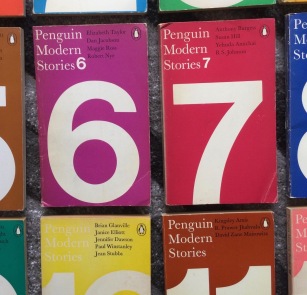PART FIVE, continued from: https://nullimmortalis.wordpress.com/26968-2/
Edited by Judith Burnley during 1969-1972
My previous reviews of older or classic books: https://dflewisreviews.wordpress.com/reviews-of-older-books/
And other Penguin short stories here: https://nullimmortalis.wordpress.com/26609-2/and https://dflewisreviews.wordpress.com/2021/12/26/the-penguin-book-of-the-contemporary-british-short-story/
When I read these stories, my thoughts will appear in the comment stream below…



ROMAN SUMMER by Brian Glanville
“cataloguing tricks, analysing attitudes”
A ‘shadow of a shadow’, but who the Bowenesque shadowy third? Or fourth? Who lays which set up of defence and attack for whom? An amazingly and arguably told football-ballet of a romcom become beautifully witty and stylish literature indeed. The feints, headings and dribbles surrounding an American female in a wonderfully evoked Rome around the times of Vietnam, and her attempts to disentangle one male Jim an American and another an Italian Sergio from both loving, both owning her, and a complication in the shadowing by her friend called Julie. It all seems to turn out to be a COLLEGE romcon! And I laughed. There was even the threat of a duel with swords! Not forgetting one of Rome’s bridges and its headless statues!
“…Jim kicking up a scene…”
My previous review of a Brian Glanville story: https://etepsed.wordpress.com/1377-2/#comment-2632
A MAN OF MYSTERY by Shiva Naipaul
Not the Shadows’ record I loved so much as a boy, but really the making of a shadow after death as a legacy that prevailed, as seen through the louvres of his coffin by then inhabitants of a street. Grant Street in Trinidad, its own history here adumbrated as the backdrop to Mr Green as presumed shoemaker in the hut appendix of his house, and Mrs Green who seemed too up market for him, and she painted art. Yet Mr Green had his skills with children as disciples showing them the mysteries of the botanical garden, including a tree that bled. But as he went downhill, his wife went up, being adopted by a doctor as her fancy man, and the house was demolished, while the hut still stood. His poignant death is nothing but a plot spoiler you simply knew would happen. But Mr Green will be remembered most as will the old vanished Grant Street and its inscrutable ways and means. PS the hut vanished along the way.
Arguably, next, the best observation so far of the Mairowitz story below? — the penalty is having to read it at all!
THE POLICE by David Zane Mairowitz
Impossible to review other than reproduce the whole of this brief story here: https://dflewisreviews.wordpress.com/the-police-by-david-zane-mairowitz/
But BEWARE, it is both nasty and meaningless beyond sharpening as well as enlarging the letter k in Kafka and then inserting them one by one inside you.
THE POLICE by David Zane Mairowitz (1972)
A candidate for the cruellest conte of all.
I don’t think it is published anywhere else nor even in any bibliographies.
Another equally powerful story in volume 11 of these volumes, with a title ending -CE by the above author… this time of substantial length…
THE GRACE by David Zane Mairowitz
“Born a boy, she would have been Franklin Delano Roosevelt Munch.”
This seems to be the struggle of this woman called Perfidia Munch, born of Mother Munch and Father Munch if not Edvard himself! In the envisioned struggles of the 1950s and 1960s of feminism, with all manner of bodily horror, migraine and morphine and man’s horror within her, a sister story to THE POLICE and throwing further night and light on it. It is a remarkable achievement of writing that posterity does not seem to have recognised. It seems to end in victory for the Moment and the Movement. But I am open to other views about this. I have found a version of THE GRACE on-line (here: https://www.bu.edu/partisanreview/books/PR1973V40N3/HTML/files/assets/basic-html/page52.html ) and one fleeting mention of it elsewhere, unlike THE POLICE that seems completely airbrushed from literary history! Till now!
THE FOUNTAIN TREE by David Plante
“; he’d sink if she weren’t around to do all the small things he left undone. He tried to say calmly he had other things to think about.”
It starts and ends with the Plante fountain tree, as if this is a writing exercise about a writing exercise to be a successful writer, hardly touching the surface, let alone getting underneath it. His wife complains she is not in it, although someone he calls his wife seems to be in it. Even their baby who dies is skated over! And this review, too, fails to do what the story failed to do.
THE FIFTEEN DOLLAR EAGLE by Sylvia Plath
“If you’ve got a back to spare, there’s Christ on the cross, a thief at either elbow and angels overhead to right and left…”
There are four of five other elbow moments in this amazing portrait of a tattooist and his tattoo shop and its customers and watching with exuding-blood vampire references the multi-coloured painterly tattooing of a man who fought in Japan, I guess, through the eyes of a woman who for one moment needs smelling salts to continue watching. It is a cornucopia of tattoos that feel as if the words are also tattoos on these yellowing pages in an old book telling me that it is copyrighted to Ted Hughes in 1969, this looking to be its first and possibly only publication? It shocks and fills one with literary joy with each jab of the needle. It includes a man who fulfils one of those elbow moments with a deeply bent bodily bow, come to service the tattooist’s needle springs. But who was Ned? Is this story personally didactic or for its own sake? To express the inexpressible before 1969. The last paragraph gives some clue, as the lady witness of all that goes on imagines the tattooist’s wife with a “death-lily-white and totally bare” body. The ‘world’s menagerie’, meantime, howling and ogling from the tattoo shop’s wall.
Pingback: THE FIFTEEN DOLLAR EAGLE by Sylvia Plath | The Gestalt Real-Time Reviews of Books Edit
AN ANTIQUE LOVE STORY (1970) by Penelope Gilliatt
“She troubled over events in the world and had no trust in the President.”
This is an astonishing deadpan, dead-eyed prophecy of a world obliquely as dystopic as our own today. Also with various characters adumbrated who behave in strange ways, but not unlike we do, and grey geometric brutalist open-plan offices, precarious relationships, and growing AI or computer control.
There is a man who arrives one night with a gun complaining he hadn’t been invited. And various instincts pre- and post- and in-step, and only the latter get on in life.
There is a passage as essential reading about a child’s lessons by telephone — far inferior to what has been optimised these days! See here: https://dflewisreviews.wordpress.com/2023/01/14/an-antique-love-1970-by-penelope-gilliatt/
THE SAME OLD STORY by Robert Nye
I couldn’t be arsed to closely read these 1970 Proustian-sized blocks of paragraphs as written without the shackles of political correctness, wildcat striking upon Christian religious tropes and exposing penises and twisting pinnacles on a Cathedral or deploying stunningly adept prose in a Cathedral society of architects and clergyman and academics. It may be a shocking comic masterpiece or it may not be. And, with this, today I have failed as a reviewer of short stories. Whatever it is, it isn’t the same old story.
THE GEOGRAPHY LESSON (1969) by Emanuel Litvinoff
This is a Just William type story in the community round Brick Lane, where the squabbling boys, after being gratuitously beaten by the schoolteacher, boast and brag about sex, and especially they seek espials of the geography of a woman’s secret parts, as if believing non-Jewish and Jewish women differ in this regard, with much talk of someone’s Shiksa having a knish at the back near the toochus….
Don’t go there!
THE POLITICAL EDUCATION OF CLARISSA FORBES (1970) by Shiva Naipaul
A novelette of the up to 17 year old schoolgirl and school-leaver in Paradise, Trinidad, more ugly than pretty, and her feisty way in life, in interface with her parents, with her frizzy hair, with an English magazine that gave her ideas of England and holidays in Torremolinos!! Her battling ever falsely blaming being wanting to be slept with by her teacher and other men, always returning to her parents with suitcase. Work as ‘au pair’ in Port au Spain, but not wanting to be deemed a servant, there is a classic argument with her employer Mrs Gokhool. And eventually she lives in, for her, a disappointing London. Eventually working for her father in respected job back in Paradise! Well, so what? A slice of an era and a race? It is a historic document as well as a well-characterised story. Not usually my sort of read, though.
THREE OR FOUR CULTURES (1972) by Brian Glanville
I remember watching the Mexico Olympics on TV, and marvelling at the athletes but despite their skimpy shorts seen in blurry images, they never became sexually human to me, even with or despite the commentary by Coleman. Now we follow, in this truly evocative story about one girl athlete, and her aspirations in her sport and the ‘times’ she did in practice — and her take up with a male Uruguayan man and gradual awareness of and involvement in local politics. You cannot get a flavour of such events and feelings on any screen unless it is written in words like this. Written fiction is actual truth, I say.
PICTURES FROM AN EXHIBITION 6
A word theme and variations on this painting by Bacon…
Both of their age, painting and prose poem.
Words by Giles Gordon.
PICTURES FROM AN EXHIBITION 7
More pretentious word-ecstatic ekphrasis by Giles Gordon based on Nikolais’s GALAXY….. Of its time. Beat poetry made prose.
“phis to philes”
THE BATTLE FOR MENDEL SCHAFFER by Emanuel Litvinoff
“In as close community as ours, each newcomer added a new complexity, changing us all a little and sometimes even the influencing the whole pattern of our fate.”
The evocative story of what we might called today a neuro-diverse boy, who learns the violin, in the highly religious Jewish community of East End London. The grandmother, the lodger, and his atheist father returns…. And the pattern changes. And a new family comes… the battle for the boy’s soul eventually overcome by wirelesses as a presage of even more involving communication systems today!?
A BALL OF MALT AND MADAME BUTTERFLY by Benedict Kiely
I could only dabble in this Joycean day (?) in Dublin, involving a Japanese good-time lady, a fireman chef, a lop-sided man called Pike looked after by his aunts, and a man who escapes from his ‘honeymoon’ down a fireman’s ladder and later gets his come uppance from his wife, and I could make not head or tail of it!
I have decided to quit reading this series while I am ahead. I have read most of the stories in this series, and some great classics discovered. I may miss a few more classics by stopping here! But finite time is now of the essence. And priorities of potential put to the fore elsewhere.
end